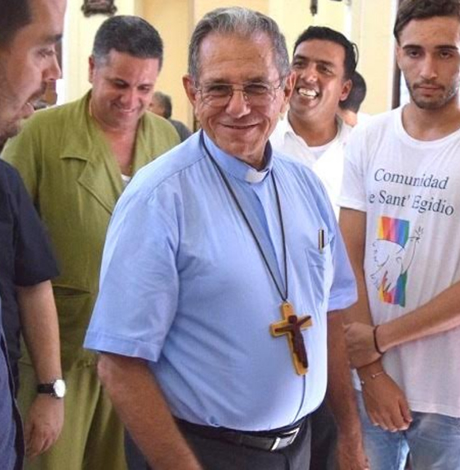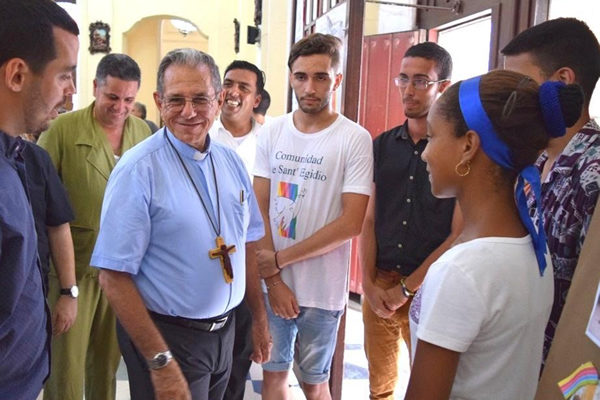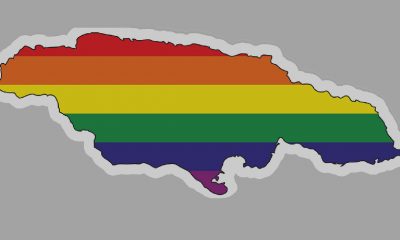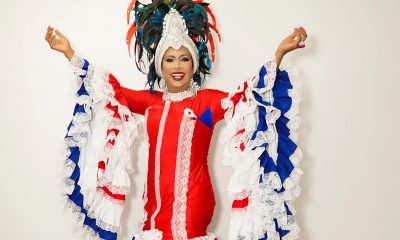News
¿Quién es Juan García Rodríguez, el nuevo cardenal cubano, y qué piensa de la comunidad LGBTI+?
El arzobispo de La Habana no ha hecho declaraciones sobre los derechos LGBTI+


Nota del editor: Tremenda Nota es el medio socio del Washington Blade en Cuba. Esta nota salió originalmente en su sitio web el 1 de septiembre de 2019.
El papa Francisco anunció este domingo en la plaza de San Pedro que próximamente se crearán 13 cardenales y uno de ellos será el cubano Juan de la Caridad García Rodríguez, arzobispo de San Cristóbal de La Habana desde 2016.
El nuevo cardenal tiene 71 años y nació en Camagüey, sede arzobispal que desempeñó como titular desde 2002, antes de sustituir a Jaime Ortega Alamino en el arzobispado habanero.
García Rodríguez se contará por su edad entre los más de 100 cardenales menores de 80 años que participarían en un cónclave para la elección de otro papa si fuera necesario.
Tres años atrás, cuando sustituyó a Ortega, el arzobispo dijo a la prensa que esperaba aumentar los diálogos con el gobierno cubano y contribuir así a que la iglesia católica participara en la educación y los medios de comunicación, además de tener más acceso a las prisiones.
Al menos en los primeros años de su episcopado no ha conseguido cumplir estas aspiraciones, aunque García Rodríguez mantiene la posición amigable de su predecesor hacia la política cubana que controla el Partido Comunista de Cuba con exclusión de otros grupos.
El pasado mes de julio, por citar un ejemplo de cautela en su relación con el gobierno, el arzobispado de La Habana prefirió no pronunciarse sobre las acciones de las autoridades para impedir que laicos católicos y periodistas independientes participaran en los funerales del cardenal Ortega.
Jaime Ortega Alamino, a quien los medios llamaron “el cardenal del deshielo” por su papel mediador en el acercamiento que tuvieron los gobiernos de Cuba y Estados Unidos en 2014, calificó de “antiguos delincuentes, sin nivel cultural, algunos con trastornos psicológicos” a un grupo de disidentes que ocuparon un templo y fueron desalojados por la policía, a solicitud del prelado, días antes de la visita de Benedicto XVI a la Isla en 2012.
Ortega también había negado, en declaraciones realizadas en 2015, que existieran presos políticos en Cuba.
García Hernández, en cambio, ha evitado declararse sobre estos temas en los últimos años.
“Por su discreción y centrismo, es la persona menos comprometida en las luchas intestinas de la Iglesia cubana”, dijo el intelectual laico Lenier González Mederos al periodista Mario J. Pentón en los días que tomó posesión el actual arzobispo.
García Hernández tampoco se pronunció el año pasado sobre la polémica alrededor del matrimonio igualitario que sí generó declaraciones de varios colegas suyos como Dionisio García Ibáñez, arzobispo de Santiago de Cuba, para rechazar el matrimonio entre personas del mismo sexo/género y atribuírselo al “imperialismo cultural”, o Wilfredo Pino Estévez, arzobispo de Camagüey, a favor de implementar una unión civil para parejas LGBTI+.
El nuevo cardenal sí figura entre los firmantes de un mensaje publicado por los obispos cubanos acerca del proyecto de Constitución que presentó el parlamento en 2018. En el documento se criticó la intención de definir el matrimonio como “la unión de dos personas” y se calificó este concepto de “mal fundado y erróneo”.
Los obispos aseguraron en el texto que no deseaban “menospreciar la dignidad de ninguna persona” y que su posición a favor del matrimonio tradicional “no significa[ba] discriminación”.
Finalmente, el parlamento modificó la redacción del artículo y optó por una redacción más técnica y neutra que fue rechazada por gran parte de la comunidad LGBTI+, incluso entre los grupos favorables al discurso oficial.
Durante los debates populares previos al referéndum de la actual Carta Magna cubana, la diputada Mariela Castro Espín, directora del Centro Nacional de Educación Sexual (Cenesex) y activista por los derechos LGBTI+, dijo a la prensa del País Vasco: “Fundamentalistas religiosos están tratando de ‘chantajear al Gobierno cubano con que no van a votar a favor de la Constitución si se deja el artículo relativo al matrimonio entre dos personas'”.
Castro Espín parecía referirse a las iglesias protestantes que dirigieron varias cartas públicas a la Plaza de la Revolución contra el matrimonio igualitario.
No hay evidencias de que la Iglesia Católica haya intentado influir sobre la redacción final del artículo relacionado con el matrimonio, aunque es probable que sostuviera conversaciones con el gobierno cubano sobre el tema, si se toman en cuenta los antecedentes de mediación política que desempeñó el arzobispado de La Habana en la persona de Jaime Ortega.
El nombramiento de un nuevo cardenal con sede en La Habana, anunciado solo a un mes de la muerte de Ortega, también expresa la voluntad que tiene El Vaticano de mantener su influencia en futuros diálogos con el gobierno cubano.
National
After layoffs at Advocate, parent company acquires ‘Them’ from Conde Nast
Top editorial staff let go last week

Former staff members at the Advocate and Out magazines revealed that parent company Equalpride laid off a number of employees late last week.
Those let go included Advocate editor-in-chief Alex Cooper, Pride.com editor-in-chief Rachel Shatto, brand partnerships manager Erin Manley, community editor Marie-Adélina de la Ferriére, and Out magazine staff writers Moises Mendez and Bernardo Sim, according to a report in Hollywood Reporter.
Cooper, who joined the company in 2021, posted to social media that, “Few people have had the privilege of leading this legendary LGBTQ+ news outlet, and I’m deeply honored to have been one of them. To my team: thank you for the last four years. You’ve been the best. For those also affected today, please let me know how I can support you.”
The Advocate’s PR firm when reached by the Blade said it no longer represents the company. Emails to the Advocate went unanswered.
Equalpride on Friday announced it acquired “Them,” a digital LGBTQ outlet founded in 2017 by Conde Nast.
“Equalpride exists to elevate, celebrate and protect LGBTQ+ storytelling at scale,” Equalpride CEO Mark Berryhill said according to Hollywood Reporter. “By combining the strengths of our brands with this respected digital platform, we’re creating a unified ecosystem that delivers even more impact for our audiences, advertisers, and community partners.”
It’s not clear if “Them” staff would take over editorial responsibilities for the Advocate and Out.

In an official statement released at the reveal event Capital Pride Alliance described its just announced 2026 Pride theme of “Exist, Resist, Have the Audacity” as a “bold declaration affirming the presence, resilience, and courage of LGBTQ+ people around the world.”
The statement adds, “Grounded in the undeniable truth that our existence is not up for debate, this year’s theme calls on the community to live loudly and proudly, stand firm against injustice and erasure, and embody the collective strength that has always defined the LGBTQ+ community.”
In a reference to the impact of the hostile political climate, the statement says, “In a time when LGBTQ+ rights and history continue to face challenges, especially in our Nation’s Capital, where policy and public discourse shape the future of our country, together, we must ensure that our voices are visible, heard, and unapologetically centered.”
The statement also quotes Capital Pride Alliance CEO and President Ryan Bos’s message at the Reveal event: “This year’s theme is both a declaration and a demand,” Bos said. “Exist, Resist, Have Audacity! reflects the resilience of our community and our responsibility to protect the progress we’ve made. As we look toward our nation’s 250th anniversary, we affirm that LGBTQ+ people have always been and always will be part of the United States’s history, and we will continue shaping its future with strength and resolve,” he concluded.
India
Activists push for better counting of transgender Indians in 2026 Census
2011 count noted 488,000 trans people in country

India is preparing to conduct a nationwide Census in April, the first since 2011.
Interim projections based on the previous Census placed India ahead of China as the world’s most populous country. A Technical Group on Population Projections projection in July 2020, chaired by the Registrar General of India, estimated the country’s population in 2023 was 1.388 billion. Transgender Indians are now raising concerns about the data collectors and their sensitization.
Activists have raised concerns about whether data collectors are adequately sensitive to the community ahead of the Census. Government training material emphasizes household engagement, data privacy and sensitivity while asking personal questions, but publicly available flyers do not outline specific guidance or training related to recording trans identity during enumeration.
Concerns around the counting of trans people in India are not new.
The 2011 Census recorded around 488,000 trans people, a figure activists and researchers have described as a likely undercount due to stigma, misclassification, and a reluctance to self-identify. Subsequent surveys and field reports have pointed to inconsistencies in how gender identity is recorded and the absence of uniform sensitivity among Census data collectors. Rights groups and policy researchers have also warned that gaps in official data affect access to welfare schemes, legal recognition, and targeted public policy, making accurate counting central to future Census exercises.
A decade after the 2011 Census formally recorded trans people as a distinct category, multiple studies have continued to document entrenched socio-economic disparities. Research has pointed to lower literacy rates, limited workforce participation and barriers to healthcare access within the community.
A National Human Rights Commission-supported study cited in subsequent reporting found a significant proportion of trans respondents reported employment discrimination, underscoring the gap between formal recognition and lived economic inclusion.
Educational exclusion has remained a persistent concern within the trans community. Studies have documented higher dropout rates, lower literacy levels and barriers to continuing education, often linked to stigma, discrimination and limited institutional support. Policy researchers note that despite formal recognition in official data after 2011, targeted interventions addressing school retention and access for trans people have remained uneven.
Access to housing schemes has reflected similar gaps.
The Washington Blade in December reported only a small number of trans people have benefited from India’s flagship low-income housing program, despite its nationwide rollout and eligibility provisions. The findings underscored continuing barriers to inclusion in welfare delivery systems.
The Social Justice and Empowerment Ministry and the Office of the Registrar General and Census Commissioner did not respond to the Blade’s multiple requests for comment regarding sensitization measures for Census data collectors and the recording of trans identity in the upcoming Census.
Karnataka state in southern India last September conducted its first statewide baseline survey of gender minorities. The Department of Women and Child Development, in collaboration with the Karnataka State Women’s Development Corporation, launched the initiative to document the lives of trans people across 31 administrative districts.
When the results were released, the survey identified 10,365 trans people. The country’s 2011 Census, by comparison, recorded 20,266 trans people in Karnataka, nearly double the 2025 figure. The discrepancy raised questions about how the state’s recorded trans population appeared to decline over 14 years.
The discrepancy in Karnataka’s survey has intensified scrutiny over how gender minorities are counted. Reports questioned the methodology used in the 2025 exercise, which was conducted over 45 days beginning in mid-September. Instead of door-to-door enumeration, trans people were required to report to designated registration sites — primarily district-level public hospitals and sub-district government health facilities. The approach presented barriers for potential participants, particularly those in rural areas, those without reliable transportation, those wary of institutional settings due to prior discrimination, or those who did not know about the count, raising the possibility of exclusion.
Bihar state in eastern India in January 2023 conducted a caste-based survey that included trans respondents.
The final report identified 825 trans people in the state, compared with 40,827 recorded in the 2011 Census. Activists disputed the figure, calling it inaccurate and pointing to community estimates that suggested higher numbers, including in Patna, the state capital, raising concerns about significant undercounting.
The 2011 Census marked the first attempt to enumerate trans people at the national level, but researchers and activists have described the exercise as limited in scope.
It recorded 487,803 people under the “other” category, a classification used for respondents who did not identify as male or female. Analysts have argued that the figure likely underestimated the community’s size.
The Census questionnaire provided three sex categories — “male,” “female,” and “other” — a framework that critics said did not fully capture the diversity of gender identity and may have affected how some respondents chose to identify.
During the 2011 Census, enumeration practices varied across regions.
In states such as Tamil Nadu, local reporting indicated estimates were at times derived from existing administrative records, including state-issued trans identity cards, rather than solely through door-to-door identification. Such approaches risked excluding individuals who did not possess identity documentation or were not registered with welfare boards, raising concerns about gaps in coverage.
Official data from the Social Justice and Empowerment Ministry shows only a few hundred trans people as of early 2025 have been issued identity cards through the national portal, despite nearly 2,000 applications being submitted. Many are still pending or have been rejected.
Critics of the 2011 Census said many Census data collectors were not adequately trained or sensitized to engage with gender identity beyond traditional binary classifications. Similar, detailed guidelines specific to trans sensitization have not been publicly made available for the 2026 Census, according to an examination of training materials and official circulars.
Akkai Padmashali, a trans rights activist, told the Blade that Census data collectors in earlier exercises were often not sensitized and lacked awareness of intersex people and gender-diverse communities. She said trans people and other gender and sexual minorities continue to face social exclusion and require careful handling during door-to-door data collection. Padmashali called for targeted training of data counting officers and said the government should treat the issue as a priority, adding the trans population is likely to be higher than what was recorded in 2011 and efforts to make officials more sensitive to the community are necessary.
“We will definitely join our hands with this move the government of India has taken,” said Padmashali. “I think there should be proper guidance from the main in-charge people who are conducting this enumeration, and if no such proper information is given to these Census data collectors, it is difficult to gather any sort of information concerned.”
“This whole issue of self-identification — I think India, in its current situation, is not in such a way that it openly accepts people’s identities,” she added. “It will be challenging, it will be difficult, it will be a struggle to offer people the opportunity to express their identities as concerned. But to make sure those who are part of the sexual minority community are counted, I think we also take responsibility for educating people to be part of the enumeration.”
Padmashali said many people are not accustomed to using mobile devices and only a limited number are familiar with them. She said technology should not mislead or misguide the collection of information. Padmashali added she and other trans people plan to engage with Census data collectors and officials who organize the Census.
“Government should have local meetings,” said Padmashali. “Government should hold regional consultations on why the national enumeration is important, because we also know that from 2011 to 2026 is almost 15 years, and now we are here.”
“The government should hold local meetings, especially in their constituencies,” she added. “If the government meets with non-government organizations and civil society groups, this could become a more inclusive exercise across the country. India has a population of more than 1.4 billion, and I think this is the appropriate time to bring accurate statistics to help draft policies in the context of the larger community concerned.”
-

 Mexico5 days ago
Mexico5 days agoUS Embassy in Mexico issues shelter in place order for Puerto Vallarta
-

 Netherlands4 days ago
Netherlands4 days agoRob Jetten becomes first gay Dutch prime minister
-

 Sports4 days ago
Sports4 days agoMore than a dozen LGBTQ athletes medal at Olympics
-

 Books3 days ago
Books3 days agoNew book profiles LGBTQ Ukrainians, documents war experiences




















